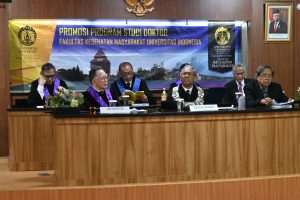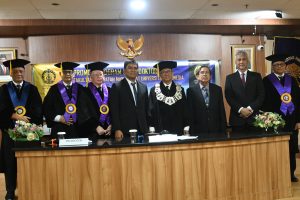
Hypertension has been identified as the main risk of death globally, there are around 10.4 million deaths per year related to hypertension. The increasing prevalence of hypertension shows that efforts to prevent and control hypertension in society are still ineffective. Low levels of awareness and inaccuracies in prevention, control, diagnosis, and early intervention programs are considered to be factors causing the increasing prevalence of hypertension. The ability to detect early and assess the risk of hypertension as well as recommend alternative appropriate treatment is one of the important things to strengthen, not only at health services but also at the community level.
“Early detection and assessment of hypertension status is an important thing to minimize the risk of cardiovascular disease,” said Rico Kurniawan in his dissertation presentation entitled “Development of a Dynamic Prediction Model for Hypertension Status Using a Combination of Machine Learning Algorithms and Multistate Markov Models for Early Detection of Blood Pressure Conditions in Populations Adults in Indonesia”, at the open session for the FPH UI doctoral promotion in Public Health Sciences, Monday, January 8 2024, in the FPH UI Doctoral Promotion Room.
Rico’s research utilizes panel data from the Indonesia Family Life Survey where hypertension is the outcome, and the factors age, gender, body mass index, physical activity and pulse rate are predictors in this study. Multivariable analysis, Multi Status Markov models, and machine learning algorithm approaches are used for further translation into an expert system. The machine learning model with a regression algorithm in this study showed good ability in classifying hypertension, with Area Under Curve values (0.751 for men and 0.794 for women) and Complete Accuracy (0.780 for men and 0.798 for women). The probability of normal blood pressure transitioning to hypertension in the next 7 years is approximately 12%. Likewise, for pre-hypertension to be normal it is 23.9% and around 38.3% have the potential to become hypertensive. Around 82.8% of people with hypertension will remain hypertensive and only have an 8% chance of being normal or 9% of being pre-hypertensive.
This research conducted in Indonesia brings a new approach to the study of hypertension with a series of innovations. Different from previous research which was conducted in various countries with a majority Caucasian population and used statistical methods, this research uses a combination of machine learning techniques with the Multistate Markov Model. This innovation enables more in-depth and dynamic analysis of blood pressure status transitions over time.

In terms of outcomes, this research not only produces mathematical models and machine learning algorithms, but also develops web-based applications. This facilitates the practical application of research findings for clinical use and by individuals for self-monitoring. In the context of predictors, this research chose to use simpler and more general variables such as sociodemographic and anthropometric factors, which include age, gender, height, weight, waist circumference, pulse rate and physical activity. This is a significant simplification compared to previous studies that may have required more complex and difficult to obtain measurements.
“So, this research offers an efficient method of early detection of hypertension for environments with limited resources and can be applied in broader public health programs. “Sociodemographic and anthropometric factors can be used as good estimators in calculating predictions of hypertension status,” added Rico.

Based on the results of his dissertation, Rico Kurniawan was successfully declared a Doctor in Public Health Sciences with a very satisfactory title. Rico is the 4th IKM doctoral graduate in 2024, the 300th IKM doctoral graduate and the 386th FPH doctoral graduate.
The open session was chaired by Prof. Dr. Mondastri Korib Sudaryo, M.S., D.Sc., as Chair of the Session, Prof. Dr. Budi Utomo, M.P.H., Ph.D., as Promoter, Prof. Dr. Kemal N. Siregar, M.A., Ph.D., and Prof. Dr. Eng. Ir. Kalamullah Ramli as co-promoter, as well as a team of examiners consisting of Prof. Dr. Anhari Achadi, S.K.M., Sc.D.; Prof. Dr. Besral, S.K.M., M.Sc.; Dr. Drs. Tris Eryando, M.A.; Dr. Soewarta Kosen, M.P.H., Dr.PH.; and Dr. Ruddy J. Suhatril, S.Kom., M.Sc. (wrk)

